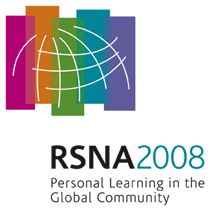
Abstract Archives of the RSNA, 2008
Hervé Monpeyssen MD, Presenter: Nothing to Disclose
Jean-Michel Correas MD, Abstract Co-Author: Nothing to Disclose
Jean Tramalloni MD, Abstract Co-Author: Nothing to Disclose
Thomas Gauthier, Abstract Co-Author: Nothing to Disclose
Olivier Helenon, Abstract Co-Author: Nothing to Disclose
Elastography of thyroid nodules has become an additional tool for characterization of thyroid nodules. It relies on subjective assessment of the nodule elasticity in comparison to that of the surrounding normal tissue. The aim of the study was to evaluate quantitative elastography in order to assess the relative elasticity of thyroid nodules.
28 patients (25 women and 3 men, mean age 57) were referred for the elastography of the thyroid nodule. Each nodule was studied using B-mode imaging and color Doppler US with a linear transducer (L12-5) on an IU 22 (Philips Ultrasound, Bothell, WA, USA). The color Doppler processing chain was modified to implement quantitative elastography. The cineloops were saved in raw data format for quantification using QLAB software (Philips Ultarsound). The elastography index was calculated by positioning a Region-of-Interest upon the nodule and the surrounding thyroid. The differential elasticity was calculated as the ratio between the nodule and the normal tissue. The final diagnosis was obtained using fine needle aspiration in all cases and pathology after surgery in 4 cases (25 benign lesions, one medullary and two papillary cancers).
The cystic lesions (n=6) exhibited variable elasticity values. One of the six showed reduced elasticity and appeared like the “bull’s eye “described in previous breast elastographic studies. Thyroiditis nodules (n=3) exhibited a high elasticity, in the same range than the normal tissue (values 0.9). The three cancers exhibited the lowest elasticity of the series (values <0.3).
Quantitative elastography appeared to be a feasible technique. Larger series are necessary to define the normal threshold and the clinical value in the assessment of thyroid nodules.
Utikity of elastography in thyroid nodule examination
Monpeyssen, H,
Correas, J,
Tramalloni, J,
Gauthier, T,
Helenon, O,
Quantitative Elastography of Thyroid Nodules: Preliminary Results. Radiological Society of North America 2008 Scientific Assembly and Annual Meeting, February 18 - February 20, 2008 ,Chicago IL.
http://archive.rsna.org/2008/6018392.html

